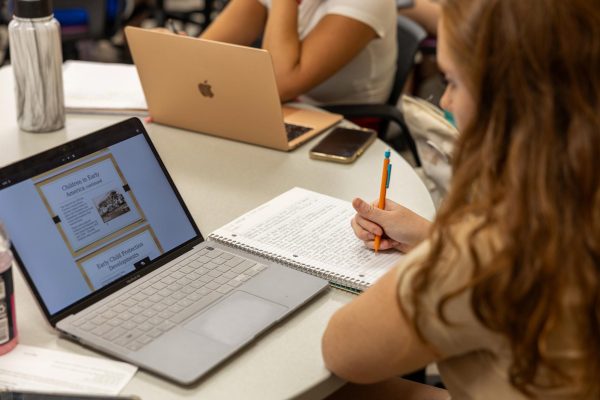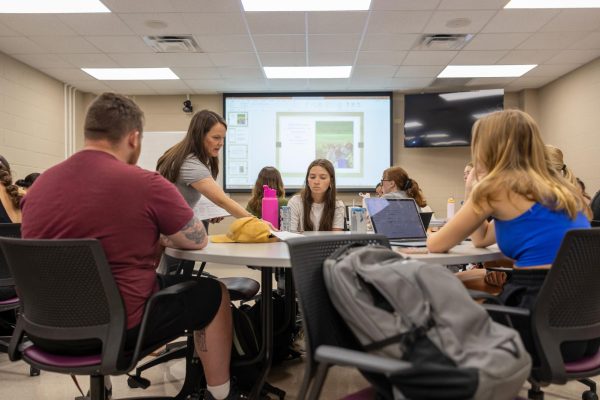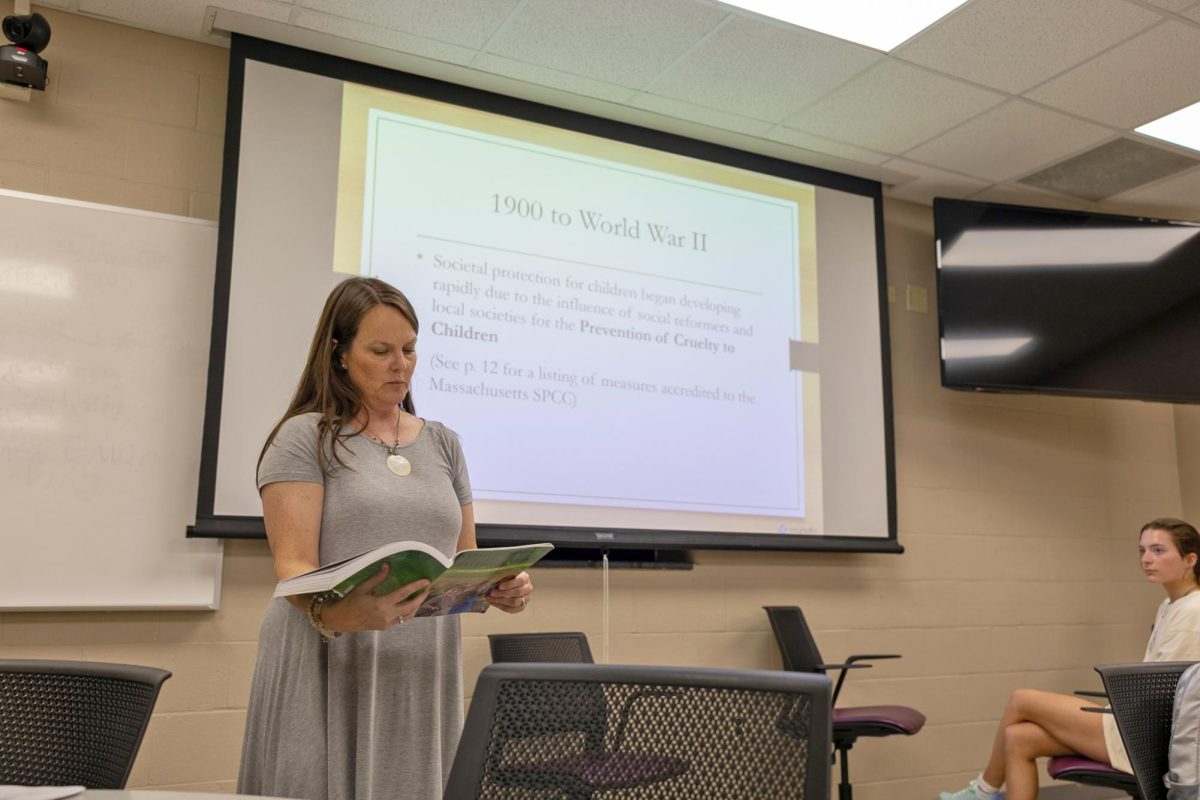Course debates, presentations, guest speakers, stories across time and an active learning environment will be found in new classes on the Hill this semester.
These classes are often developed by professors in their respective fields, who have a desire to enhance the academic experience and welfare of their students.
The courses must go through a vetting process in order to be approved, and some go through a “pilot semester.” This semester, there are new classes across the board, including CHHS 100: Introduction to Child Welfare, HIST 302: Disability in the United States and PS 99: Fundamentals of Mock Trial.

INTRODUCTION TO CHILD WELFARE
CHHS 100: Introduction to Child Welfare, is a Colonnade class that satisfies the social and behavioral explorations category. The class’s purpose is “preparing students to actively collaborate across the disciplines including criminal justice, psychology, sociology, social work, education, & health sciences,” according to the program’s flyer on social media.
Julie Jones, the professor for this course, has been working in childcare for 19 years.
“In 1999, that’s when I applied to the state of Kentucky to work in Child Protective Services,” Jones said. “It’s very hard, but very rewarding.”
Part of what makes this class so different from other CHHS classes is its interdisciplinary nature.
“Social work is so broad,” Jones said. “So many times I feel like society thinks social work is only Child Protective Services and that’s not accurate. Social workers are in so many areas. We’re in hospitals, we’re in schools, we’re at dialysis centers, we’re in sports, we are everywhere.”
The textbook for this class, “Child Welfare and Child Protection: An Introduction,” was co-written by David Royse and WKU’s own Austin Griffiths, assistant professor in the Master of Social Work program. He is also the director of the LifeSkills Center for Child Welfare Education and Research, as well as a WKU alum, having studied sociology and social work on the Hill. Griffiths, much like his colleague Jones, felt there was a need for this class on campus, having experienced child welfare firsthand.
“As a frontline child welfare worker, it’s all about being prepared, feeling comfortable, and understanding how things work,” Griffiths said. “There was a gap and there was a need. It was really a practical endeavor.”
However, this class existing was not the only goal. Professors within the social work program wanted the class to engage students in an advantageous atmosphere. Griffiths said they felt like the class needed to be beneficial as well as exciting to attract students and to grow them as people.
When it comes to the intentions for this class, Jones and Griffiths agreed that they want students to understand the expansiveness of child welfare, that they know how to help others and that they enact change.
“My main goal in the class is just to educate students on what child welfare is,” Jones said. “It’s not just Child Protective Services, it encompasses so many other services and communities, and it is in every community.”
Griffiths agreed with Jones, and went on to explain his hopes for their development of awareness.
“I hope that it (the class) develops an awareness on behalf of this community where people can understand not only what’s happening around them, but they can certainly respond in a proactive way to be a part of this alliance that we’re building,” Griffiths said.

DISABILITY IN THE UNITED STATES
The history of disability in the United States is a subject oftentimes overlooked and not normally prevalent in coursework or history books.
Audra Jennings, a WKU history professor and department chair, became interested in the topic when her own grandfather, a coal miner in western Kentucky, suffered an accident, rendering him disabled. He was drafted for World War II but could not serve due to his injuries, and thus worked in an armament factory instead.
“When I was a kid, he told all these stories about disabled people working in this factory, and everything that I was learning about World War II, that stood out as something,” Jennings said. “It wasn’t in any of the history that I was reading, and so I was fascinated. It seemed like disabled people played this very critical role in the war, but that seems invisible in the history that we share about the war.”
On top of the Hill in Cherry Hall, Jennings has the opportunity to share this passion.
She is teaching HIST 302: Disability in the United States, another course that fulfills a Colonnade requirement.
Jennings authored the book for her class and is planning to engage with her students by reading historical material and hosting discussions.
“We’re going to read a lot of texts from different time periods, and we’ll be having lots of different discussions, looking at historical objects, and we’re also going to read more recent stuff about disability today,” Jennings said. “Right now, around twenty percent of Americans have disabilities, and disability is really central to how our government thinks about citizenship and the categories that we have that shape the relationship between citizens and the government.”
Jennings is most excited about actually teaching the course and seeing the variety of students that choose to take it.
“I think I’m just really excited about teaching this class and seeing who is interested,” Jennings said.
“I was looking at the roster, and it looks like it was a really wide range of majors and that’s really exciting to me to see what draws people to study disability in the United States.”

FUNDAMENTALS OF MOCK TRIAL
A floor up in the same building, Kelsey Truxal will be instructing PS 99: Fundamentals of Mock Trial. This course is not to be confused with the Mock Trial Team, however. Despite one being an accredited course through the university and the other being an extracurricular, the team was what inspired the development of the class.
“Historically, we have had a mock trial program before. We’ve done it, from my understanding, as a student [organization] where it was student led,” Truxal said. “Sometimes they’ve had a coach, sometimes they haven’t, and then it went defunct.”
Truxal explained how students used to be able to get credit from being a part of the Mock Trial Team, but students weren’t satisfied with the program in place.
“Previously, you could get credit for being on mock trial, but none of us really liked that format because people were starting at different levels,” Truxal said. “We decided this year that we would have two programs at once where there is a student [organization] and anybody who wants to join the student [organization] can. Then the class is for anybody who may be interested in mock trial, anybody who may be interested in litigation …”
Both the student organization and the class have no limit on the majors that can participate, a common feature amongst all the new Colonnade courses this fall.
Students participating in the course this fall explained how useful and fun the class can be.
“I think it’s going to be really beneficial,” Addy Holley, a junior strategic marketing major and member of both the Mock Trial Team and class, said. “I think in the past couple of years, we have really started to boost the pro- gram, but I think the class is the next step to expanding.”
Other students find the storytelling aspect of the class to be their favorite.
“Working together and knowing how you are going to convey that story and creating that story
with your team is the most fun experience that I’ve had on campus,” Ethan Huffaker, a double major in mathematical economics and philosophy, as well as a member of the Mock Trial team and class, said.
Truxal is most looking forward to watching her students grow over the course of the semester.
“I love seeing (the students) perform that first competition and just knowing when they hit the right objection, or when they have a great response to opposing counsel, that’s my favorite part,” Truxal said.
News Reporter Bailey Reed can be reached at bailey.reed740@topper.wku.edu



